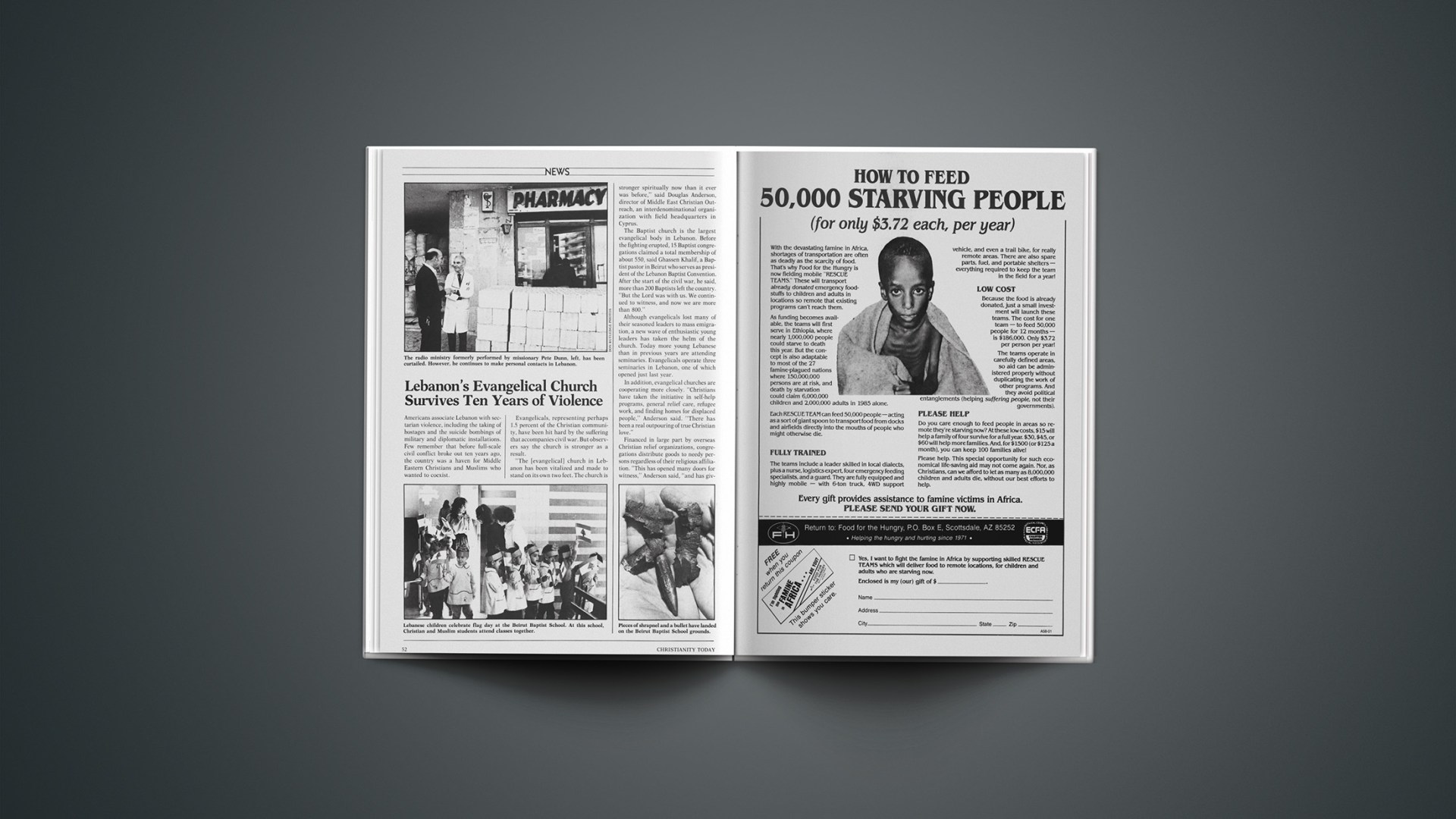Americans associate Lebanon with sectarian violence, including the taking of hostages and the suicide bombings of military and diplomatic installations. Few remember that before full-scale civil conflict broke out ten years ago, the country was a haven for Middle Eastern Christians and Muslims who wanted to coexist.
Evangelicals, representing perhaps 1.5 percent of the Christian community, have been hit hard by the suffering that accompanies civil war. But observers say the church is stronger as a result.
“The [evangelical] church in Lebanon has been vitalized and made to stand on its own two feet. The church is stronger spiritually now than it ever was before,” said Douglas Anderson, director of Middle East Christian Outreach, an interdenominational organization with field headquarters in Cyprus.
The Baptist church is the largest evangelical body in Lebanon. Before the fighting erupted, 15 Baptist congregations claimed a total membership of about 550, said Ghassen Khalif, a Baptist pastor in Beirut who serves as president of the Lebanon Baptist Convention. After the start of the civil war, he said, more than 200 Baptists left the country. “But the Lord was with us. We continued to witness, and now we are more than 800.”
Although evangelicals lost many of their seasoned leaders to mass emigration, a new wave of enthusiastic young leaders has taken the helm of the church. Today more young Lebanese than in previous years are attending seminaries. Evangelicals operate three seminaries in Lebanon, one of which opened just last year.
In addition, evangelical churches are cooperating more closely. “Christians have taken the initiative in self-help programs, general relief care, refugee work, and finding homes for displaced people,” Anderson said. “There has been a real outpouring of true Christian love.”
Financed in large part by overseas Christian relief organizations, congregations distribute goods to needy persons regardless of their religious affiliation. “This has opened many doors for witness,” Anderson said, “and has given some of the evangelical churches real credibility in the eyes of local people and authorities.”
While Lebanon’s evangelical churches have suffered and survived, evangelical publishing efforts could become a casualty of the war. For decades Lebanon has served as a center of Christian publishing, broadcasting, and educational outreach to the Middle East. At one time scores of mission organizations maintained headquarters or branch offices in the tiny country. Because Lebanon’s constitution guarantees religious freedom, Western mission agencies used the country as a launching point for Middle East outreach.
With the outbreak of sectarian violence, however, many organizations found it difficult, if not impossible, to carry on their work. During the last decade, the missionary force shrank from more than 100 to fewer than 30. Some expatriate organizations moved their Middle East head quarters to Cyprus, Egypt, Europe, or the United States. Some decentralized their Arab ministries, and others abandoned them altogether.
“Some have left good national works behind them,” Anderson said. “Among those who are left, there is more of a sense of cooperation.”
Some of the largest and best-established ministries remained in Lebanon. Production of literature has continued at normal levels, although publishers have found it necessary to distribute their materials through Cyprus.
Unless Lebanon’s situation changes for the better, the outlook for continued missionary activity in the country is dim. Many of the veteran missionaries who remain in Lebanon will retire in the next few years. New missionary candidates are understandably reluctant to volunteer for service in a war zone.
Nevertheless, the commitment of the evangelical organizations that continue to work in Lebanon is strong. “We are continually looking at the situation and discussing what can be done,” said Dale Thorne of the Southern Baptist Foreign Mission Board. “Our people will stay there and witness as long as they can.”










